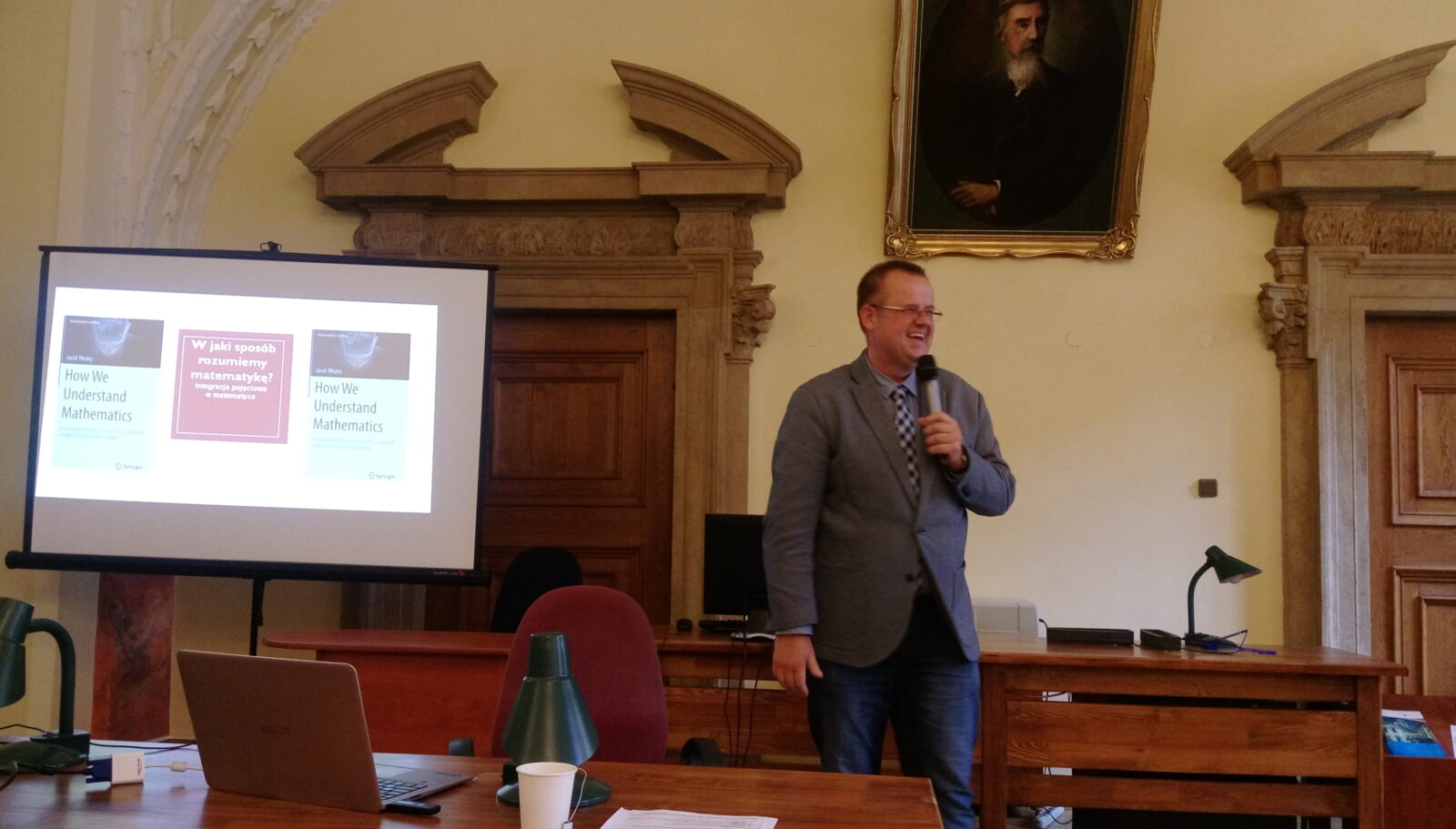
Opening of the center
THE CENTER FOR COGNITIVE RESEARCH ON LANGUAGE AND COMMUNICATION WAS INAUGURATED ON WEDNESDAY, 24TH OF OCTOBER 2018, IN THE ROOM NAMED “NEHRING” IN THE INSTITUTE OF POLISH STUDIES
At the beginning, prof. Marcin Cieński, Dean of the Faculty of Letters spoke, who emphasized the importance of international cooperation and interdisciplinary research and expressed his joy that the Center for Cognitive Research on Language and Communication integrates the activities of researchers of different specialties.
This was followed by an online lecture by prof. Anna Wierzbicka, a distinguished language researcher from the Australian National University in Canberra, entitled “Can people profess one (completely the same) faith without a common language?” (lecture abstract). Her academic path, as prof. Jerzy Bartmiński puts it, led from research on the syntax of Polish Renaissance prose to cross-cultural semantics. In 2010 Anna Wierzbicka received the “Polish Nobel”, i.e. the award of the Foundation for Polish Science. Among her greatest achievements is the development of an alphabet of human thoughts consisting of universal concepts and grammatical constructions defining the rules of their combination. It allows to describe and compare different languages and cultures. An extension of this concept is the so-called “minimal language”, which in her lecture she applied to the semantic explication of the Polish text of the Creed (comparing fragments with Greek, Latin, Russian and English versions). Dr Zuzanna Bułat-Silva from the Centre for Cognitive Research at the University of Warsaw, who is currently conducting research at the University of Canberra and was the initiator of prof. Anna Wierzbicka’s virtual invitation, was responsible for organising the lecture on the Australian side.
After the lecture, the audience asked the speaker questions about the minimal language and its usefulness and the details of the explication itself, including the use of metaphors and the problem of the text sender. Prof. Wierzbicka pointed out the numerous practical applications of minimal language, e.g. in contacts between doctors and patients and in the communication of pilots.
The second part of the meeting, devoted to recently published books by Wrocław cognitive linguists, was opened by Paweł Kaczyński, prof. of the UWr, Director of the Institute of Polish Studies. Cultural and linguistic identity of the Lemkos from an ethno-linguistic point of view” – was presented by dr Małgorzata Misiak. She indicated four most important planes on which Lemkos’ identity was shaped: their language, territory, religion and history. Dr Jacek Woźny, author of the dissertation “How We Understand Mathematics. Conceptual Integration in the Language of Mathematical Description”. He explained how a complex, multi-level structure of mathematical concepts is created and what role conceptual amalgams play in this process. He followed with the most important results of his research on the Polish language spoken by the second generation of Polish emigrants, extensively presented in his dissertation “Communication strategies of bilingual people. On the example of Polish language inherited in Germany”, was summarized by dr hab. Anna Żurek. She described the most important ways that early bilinguals use to overcome communication difficulties caused by their lexical deficits in Polish as an inherited language. The final part of the meeting focused on two books: “Metaphoricity of Conventionalized Diegetic Images in Comics: A Study in Multimodal Cognitive Linguistics” by dr Michał Szawerna, who analyses time metaphors in comics in an innovative way, and “Radość we współczesnym języka hiszpańskim i Polski Kognitywna analiza semantyczna wybranych leksemów” by dr Joanna Popowicz. In spite of the fact that Joanna Popowicz’s research shows that from a semantic point of view, happiness in Polish seems to be more difficult to achieve than in Spanish, and Polish joy is slightly more serious than the Spanish one, the participants of the meeting ended it in a joyful mood, particularly happy about professor Anna Wierzbicka’s lecture.
Translated by Agnieszka Borgul (student of English Studies at the University of Wrocław) as part of the translation practice.


















